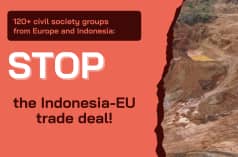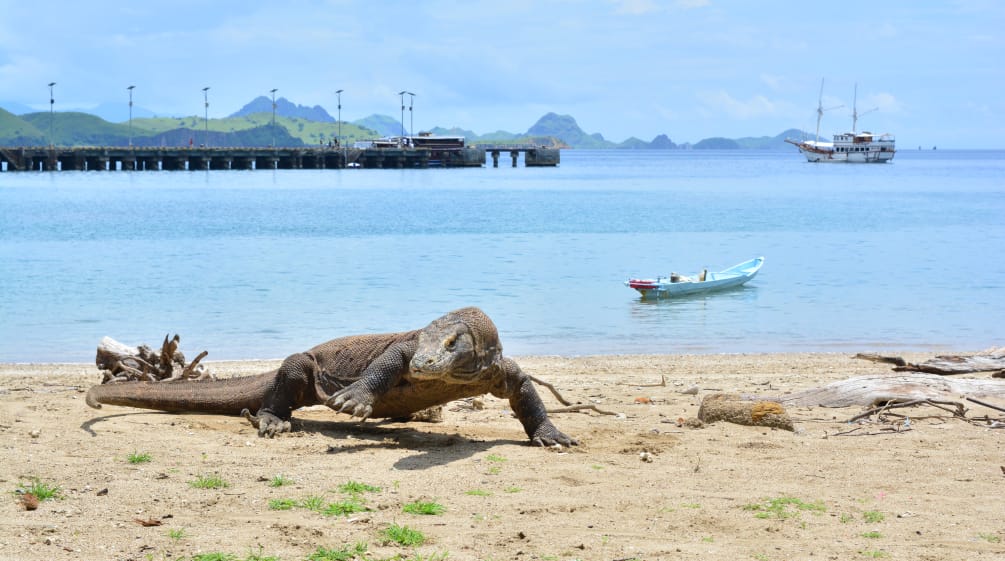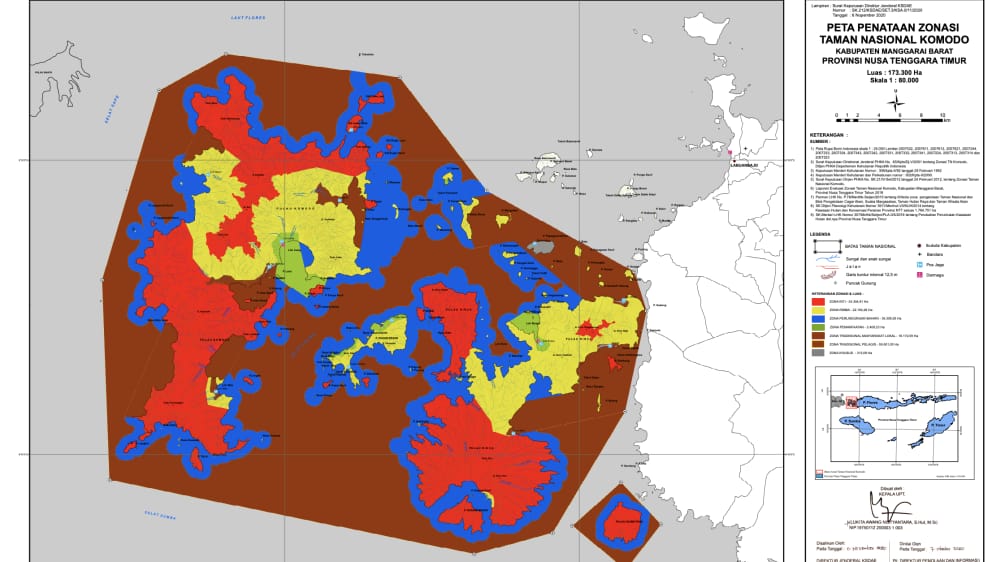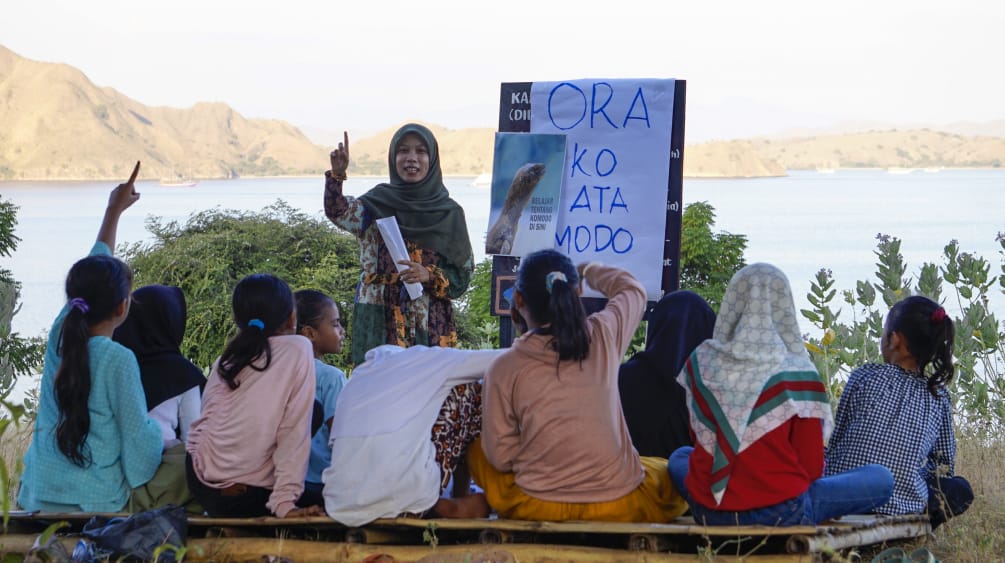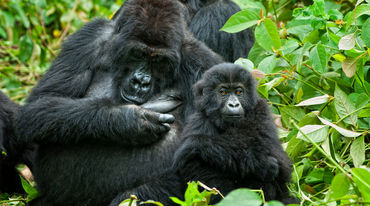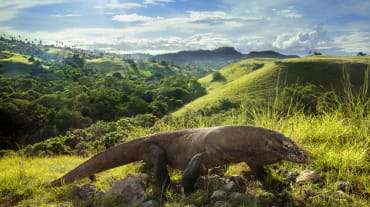In defense of the Komodo dragons: locals resist “Jurassic Park”
Nov 2, 2023
Work on a “Jurassic Park” tourist attraction is transforming the Komodo Islands in eastern Indonesia and threatening the habitat of the unique Komodo dragons. Excavators have moved in, construction cranes are turning and protests are being brutally suppressed. Our petition to protect the Komodo dragons will be handed over in Jakarta and Berlin on November 10.
The conversion of Komodo National Park – the sole habitat of the famous Komodo dragons – into a “Jurassic Park” is causing unrest. Interventions in the national park, which is also a UNESCO biosphere reserve, are endangering ecosystems on land and in the sea and leading to the relocation of people and Komodo dragons. In a cruel twist, parts of the protected area have been closed to local people, yet companies are allowed to build luxury resorts.
While the hotels have not yet been built, infrastructure work is in full swing. Viewing points, visitor centers and roads are being built. Even more profound changes are being felt on the island of Flores: The port city of Labuan Bajo, the starting point for visiting Komodo National Park, is now the center of a “strategic tourism region” – a second Bali. The city has a new airport and several new hotels. A dam and a geothermal power plant are being built on land from which local people were evicted and forests cleared. The population on Flores is seeing their livelihoods and culture dwindle – the people on Komodo are not alone in this respect.
Resistance to environmental destruction, resettlements and the massive limitation of work opportunities as fishermen, farmers and tourist guides is growing. The government has reacted to criticism and protests with security forces, violence and criminalization.
Petition for the protection of Komodo dragons
“It’s not just about the Komodo National Park,” says Umbu Wulang from our partner organization WALHI NTT. The expansion of the national park into a tourism hub will not end with the construction of the new hotels – they will need water, electricity and food. “Other national strategic projects such as the geothermal power plant in Poco Leok or the dam in Kupang are also destroying the environment. Indigenous people are slipping into poverty, and when they speak out, they are harrassed and criminalized.”
Together with our Indonesian partners, we launched a petition that will be handed over in Jakarta and Berlin on November 10, 2023. In it, we reiterate the demands of 35 organizations in eastern Indonesia representing the people of Komodo, Flores and the neighboring islands:
- stop the violence against the people of Labuan Bajo and critics of the projects
- show respect for civil rights and human rights
- provide better public information, consultation and transparency on projects that impact people
- offer medical and psychological help for victims of violence
- show respect for criticism
- withdraw the permits for land-intensive tourism projects
Solidarity against land grabbing: the case of Nicodemus Manao
The fate of Nikodemus Manao shows how valuable it can be for environmentalists from Asia and Europe to work together: The Indigenous man from Flores spent over a year in behind bars because he wanted to defend his traditional land and protect his community’s forest.
He’s free again! Rainforest Rescue was able to help resolve this situation.
The background to the arrest of Nikodemus Manao is a 40-year land conflict between the province and the Besipae Indigenous community. The case revolves around 3,700 hectares of forest leased by an Australian company which operated a cattle farm there until 2012. Since then, the province has laid claim to the forest. Repeated attempts to evict the people failed due to their determined resistance.
During the eviction which was ordered in 2020, Nikodemus Manao allegedly struck an officer – a false accusation, according to his lawyer. Without hearing any witnesses, Manao was sentenced to six months in prison in July 2023. In August, Manao was released thanks to the intervention of organizations including Rainforest Rescue. This case is one of hundreds and exemplifies the conflicts over land rights in which Indigenous people and smallholders lose out.
- Segara Komodo Lestari on 22.1 hectares on Rinca Island;
- Komodo Wildlife Ecotourism on 274.81 hectares on Padar Island and 154.6 hectares on Komodo Island;
- Synergindo Niagatama on 6,490 hectares on Tatawa Island (data from WALHI NTT)
https://tirto.id/dua-perusahaan-di-tn-komodo-akan-dievaluasi-walhi-desak-cabut-izin-gnuW
Video from a local TV station about his release:
https://www.youtube.com/watch?v=keH9pjVwjJUMongabay (Indonesian) on the land conflict:
https://www.mongabay.co.id/2020/05/21/masyarakat-adat-pubabu-tolak-klaim-lahan-pemprov-ntt-kenapa/WALHI NTT advocated for the incarcerated man:
https://walhintt.org/ragu-dengan-pengadilan-terdakwa-dan-keluarga-nikodemus-manao-tidak-banding/Catholic UCANews reporting in English:
https://www.ucanews.com/news/indonesian-tribal-christian-faces-jail-over-land-dispute/101955


